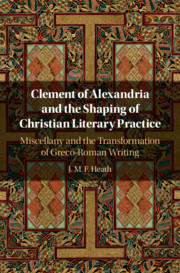 Clement of Alexandria and the Shaping of Christian Literary Practice
Clement of Alexandria and the Shaping of Christian Literary Practice A Christian among Roman Miscellanists
Published online by Cambridge University Press: 16 December 2020
Clement of Alexandria’s Stromateis have long been recognised as a Christian version of the Greco-Roman genre of the miscellany. But how Clement shaped the Classical literary form for Christian formation deserves closer attention. In general, Classicists have studied miscellanies but not Clement, while Theologians have studied Clement but not miscellanies. By situating Clement's literary project in relation to Roman miscellanies, this book argues that Clement consistently reinterprets topoi and tropes of the Classical form through a Christian theological vision. His Christianisation of the genre is deeper and more interesting than has been recognised, as he seeks to enable his readers at once to delight in the variegated beauty of God and to become ever more focused on the contemplation of the one, hidden and transcendent Teacher, into whose likeness they are growing.
To save this book to your Kindle, first ensure no-reply@cambridge.org is added to your Approved Personal Document E-mail List under your Personal Document Settings on the Manage Your Content and Devices page of your Amazon account. Then enter the ‘name’ part of your Kindle email address below. Find out more about saving to your Kindle.
Note you can select to save to either the @free.kindle.com or @kindle.com variations. ‘@free.kindle.com’ emails are free but can only be saved to your device when it is connected to wi-fi. ‘@kindle.com’ emails can be delivered even when you are not connected to wi-fi, but note that service fees apply.
Find out more about the Kindle Personal Document Service.
To save content items to your account, please confirm that you agree to abide by our usage policies. If this is the first time you use this feature, you will be asked to authorise Cambridge Core to connect with your account. Find out more about saving content to Dropbox.
To save content items to your account, please confirm that you agree to abide by our usage policies. If this is the first time you use this feature, you will be asked to authorise Cambridge Core to connect with your account. Find out more about saving content to Google Drive.